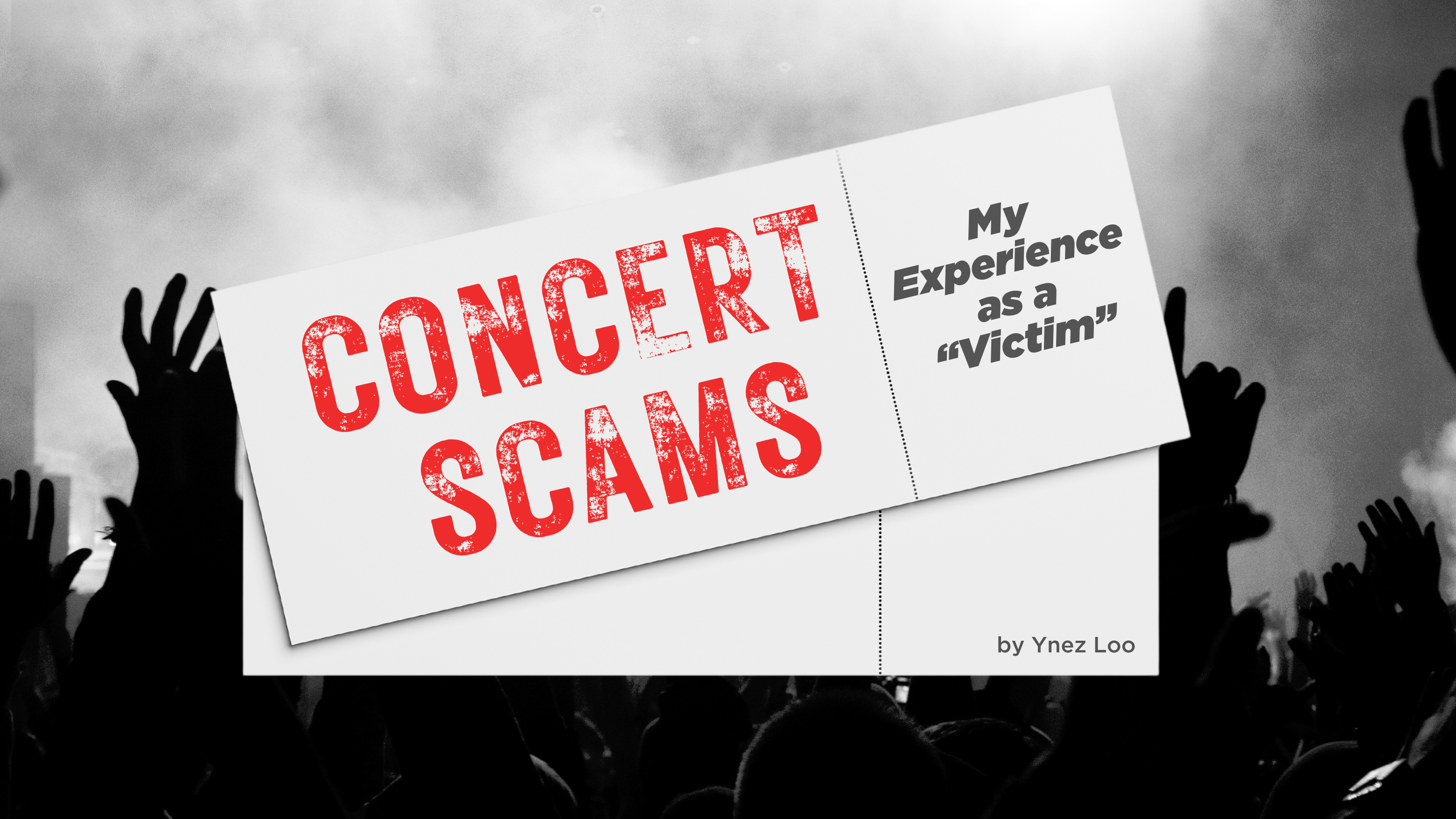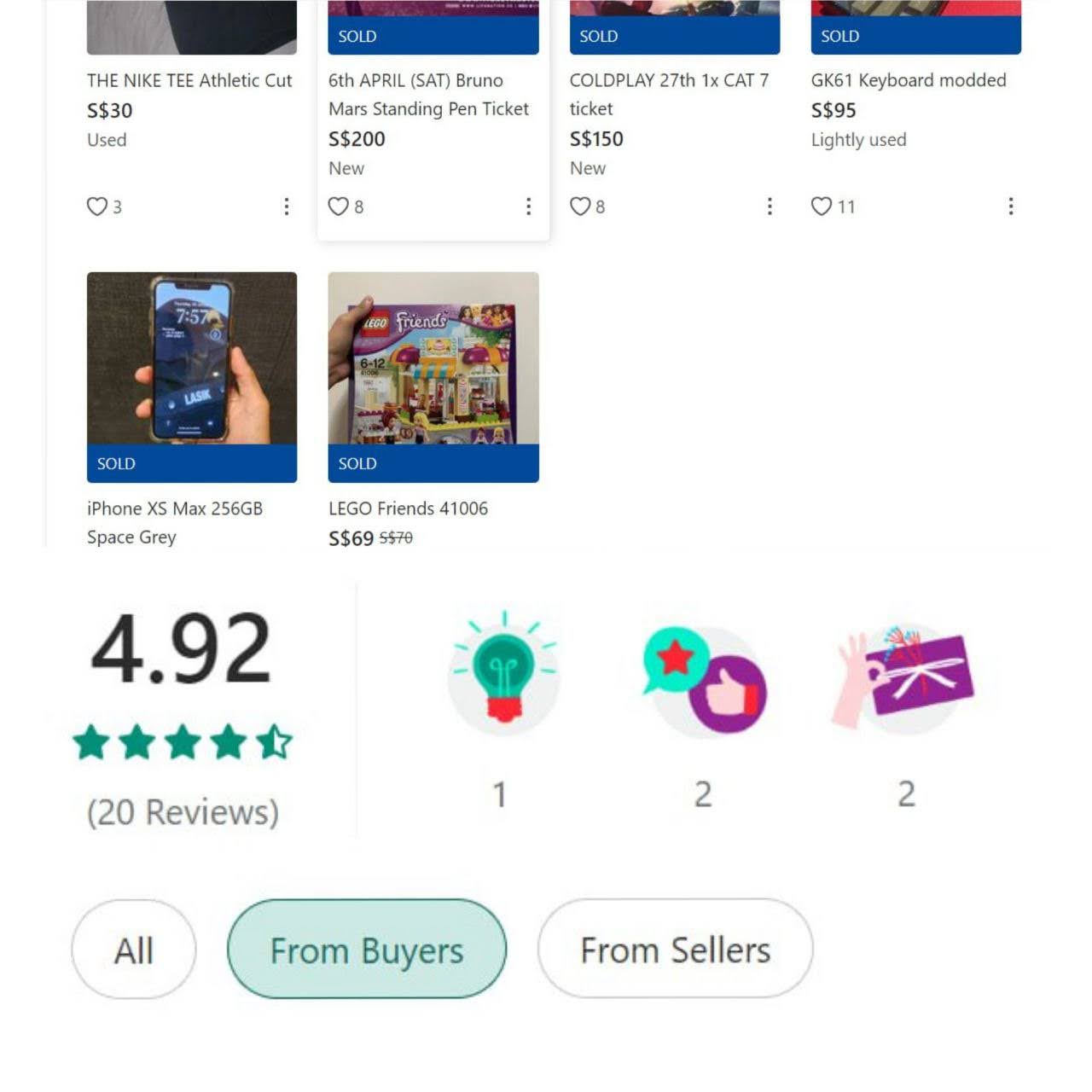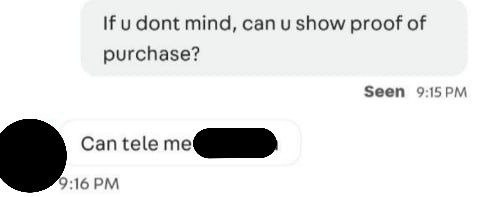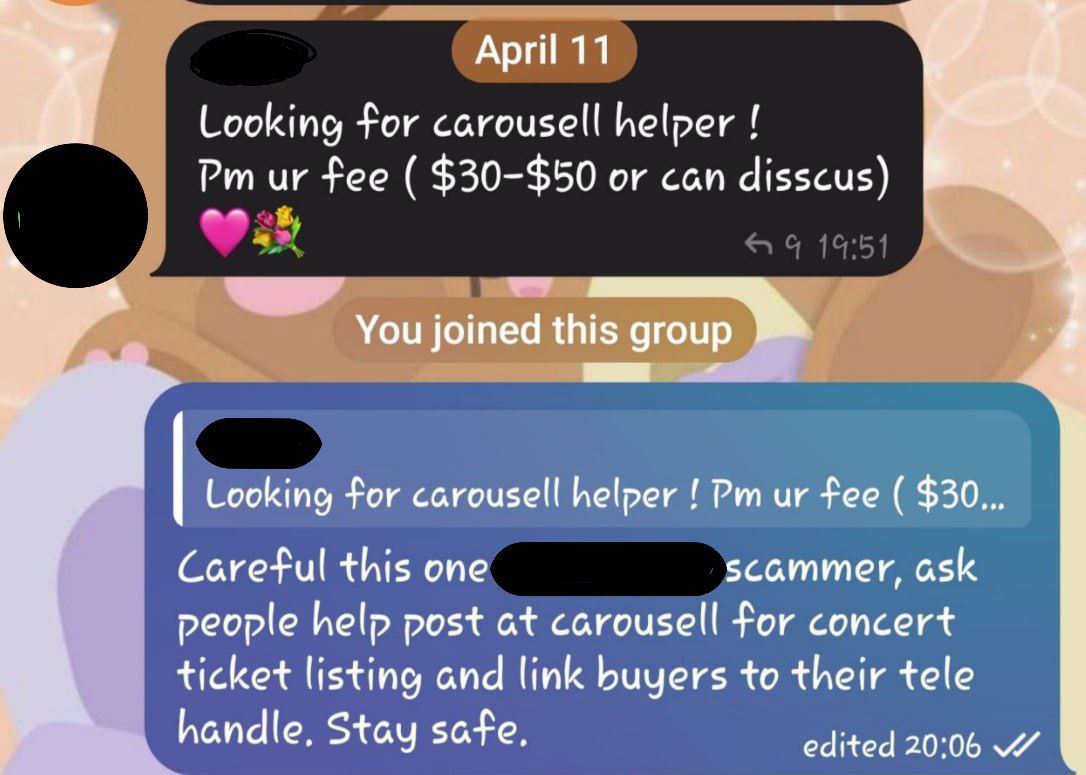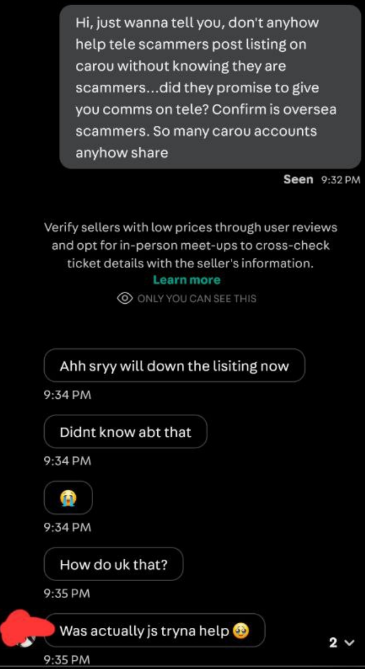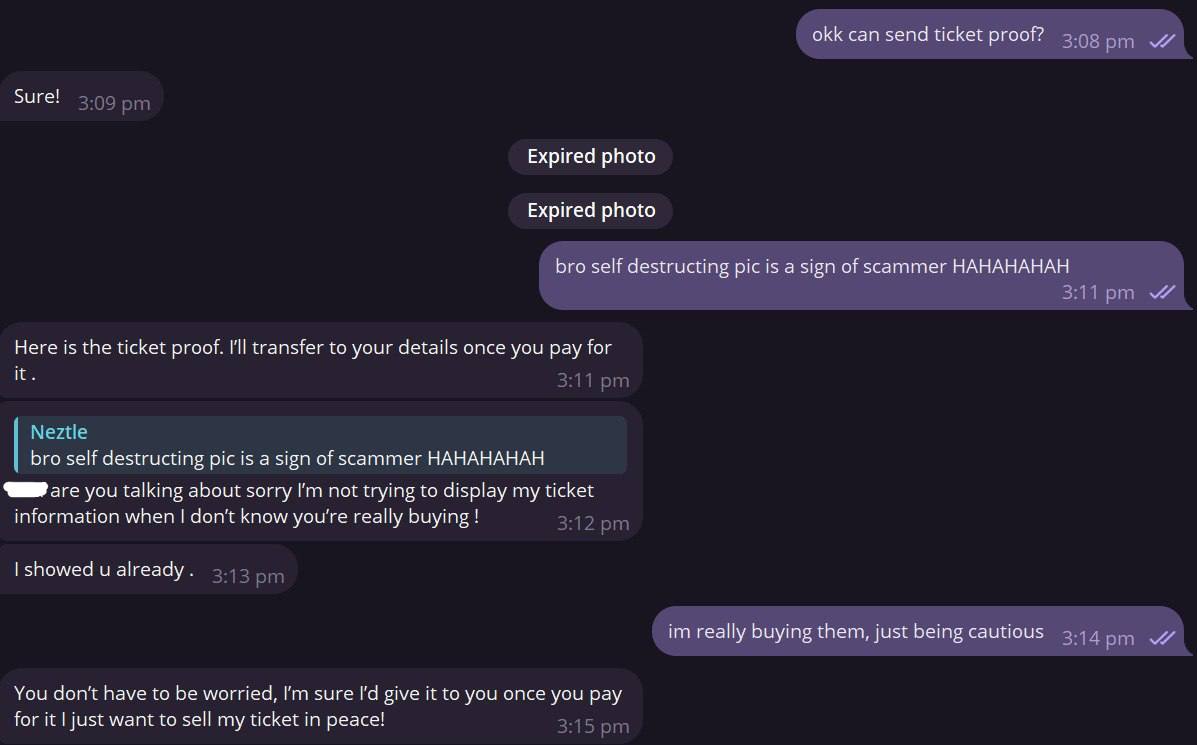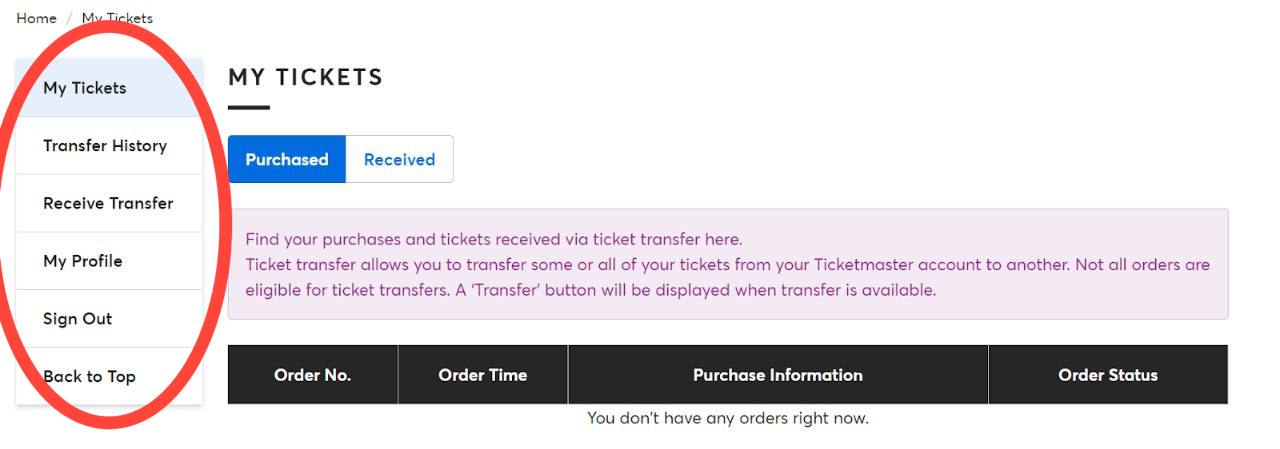(Reader mode is recommended for optimal viewing on mobile devices.)
We had Coldplay in January, Ed Sheeran in February, Taylor Swift in March and Bruno Mars in April. The 4th year of the 2020s began with a bang, with our island nation hosting 4 major concerts over just 4 months - a record for the country. These concerts brought in hundreds of millions to the Singapore economy, but the millions lost to concert scams dampened these numbers. Now that we can finally take a breather from sweaty mosh pits and long merchandise lines, what can we learn from these four months about staying safe against concert scams?
Scammers are getting smarter by the day, and their tactics are ever-evolving. Since it was hard to pinpoint all the scammer tactics from articles and TikTok videos, I decided to let myself get “scammed”. Before I begin, perhaps it will be worthwhile to first understand the basics of staying safe from concert scams and to understand the most common scam tactics before continuing this article about its evolved forms.
In mid-March, K-pop idol IU sold out 2 nights for her Singapore stop for the H.E.R. World Tour held at the Singapore Indoor Stadium. With many still scrambling for tickets to hear the soloist’s heavenly vocals in person, scammers have swooped in to take advantage of fans’ desperation for a once-in-a-lifetime opportunity to meet her. I posed as one of many desperate fans on Carousell and Telegram, 2 of the most common e-commerce scam platforms. Over 2 weeks, I messaged countless sellers to observe how scams evolve in real time.
Carousell
Starting strong with Singapore’s top online marketplace, Carousell. There were so many concert ticket scams on this site that Carousell had to ban the sale of any tickets for the Taylor Swift concert earlier this year. However, they did not ban the sale of IU tickets on the site, so here are some of the tactics scammers have used this time around and how to combat them.
1. Who’s the owner of the account? Check the legitimacy of the account you are dealing with.
A new scammer tactic is for scammers to buy Carousell accounts from verified users. This meant scammers could now act under the guise of having numerous good reviews and a fully verified account from Carousell while being harder to track down as the details of the bought account would not belong to them.
If a user has many reviews left for them on their account but has little to no sold listings left, chances are the account was bought and then cleared to be used for scamming people. Despicable, but it happens.
Example of a Carousell account with several reviews but little to no prior sold listings
If you are looking to deal with any such users, proceed at your own risk as there is a good chance of you being scammed of hundreds of dollars for non-existent tickets.
2. Helping a friend to sell tickets, but the friend can’t sell the tickets themselves? Be cautious when dealing with sellers who are not the actual owners of the tickets.
If the Carousell seller stated that they are helping a friend to sell their tickets, that is a red flag for you. Of course, I don’t doubt that this might happen for some, but it is often a cover-up for a scam that lurks beneath the surface. I came across multiple sellers who claimed to be helping their friend sell tickets and when I texted them, I was quickly referred to their “friend” on Telegram, where I would then be told to transfer money for the ticket. A quick check with a phone-checker bot told me that the friend’s number was not a Singaporean number, raising another red flag. Many scammers would be based overseas so that they would be safer from the Singapore law.
Another variation of this scam is for the seller to ask you to message them on Telegram or WhatsApp after chatting on Carousell. There should be no real reason why they are unable to keep chatting on Carousell as the app already has all the functions one would need to solidify a deal. As long as you do not remain chatting with the seller on the Carousell app, chances are they are a scammer.
Screenshot of my conversation with a potential seller who suggests to switch to using the Telegram messaging platform
Many “sellers” are victims as well, since scammers might make these “sellers” their money mules without their knowledge. Scammers can recruit oblivious money mules by promising them a commission fee for every “sale” they make.
Screenshot of potential scammers looking for 'Carousell helpers'
Some ‘money mules’ are actually unaware that they are helping potential scammers
Not sure what a money mule is? They are defined as someone who allows criminals to control their accounts or help them perform transactions. This is not a new occurrence, with more than 19,000 individuals arrested as money mules between 2020 to 2022 alone. A surge in the demand for concert tickets to widely acclaimed artists has led to a surge in money mules, more than the law can keep up for now. Therefore, you must be vigilant and refrain from revealing any personal information, including your Paynow number or bank account number, until the actual transaction.
3. Why don’t you want to exchange reviews? Be cautious around sellers who act suspiciously.
Undoubtedly, reviews of a seller or buyer make them seem more legitimate and trustworthy. Of course, it would be suspicious if a seller refused to write a review for you as a buyer. Scammers use this tactic to prevent you from being able to track them after they get your money. It would do you good to initiate the exchange of reviews before transacting with the seller. At the end of the day, the main tip to protect yourself from such scams is to simply stop interacting and not buy from them if they raise any suspicions.
Telegram
For my fellow Gen-Zs, Telegram has mostly taken over as the main messaging app, with the added function of Telegram Channels allowing people from all walks of lives to chat with each other. Now, Telegram Channels are used for selling concert tickets too. It was ranked the third most commonly used platform for e-commerce scams in 2023, so don’t take this messaging app lightly!
1. Why can’t you send normal pictures? Sellers who send self-destructing pictures of their tickets might be scammers.
Self-destructing pictures of tickets are one of the biggest red flags when buying tickets from Telegram. Typically, this means that the “sellers” don’t want you to scrutinise the picture too closely since the ticket is photoshopped or stolen from another legitimate seller. It also adds another level of security for the “sellers” as potential buyers will not be able to screenshot the picture as proof that they were scammed. If the scammer refuses to send a normal picture of the tickets, it’s a sign for you to back out of the deal.
I tried to call out a scammer on their use of self-destructing pictures, and they got defensive real fast. This is another scammer tactic, where they get aggressive and try to gaslight you into thinking you are in the wrong for being suspicious.
Screenshot of conversation with a potential scammer who sent me a self-destructing photo of the tickets on Telegram
I was never truly gaslit as I was fully aware of this, but I have seen some victims who did almost get scammed. Stand your ground, if they were not scammers it should be no problem to provide a normal picture of the ticket.
2. Is that your real name? Be suspicious of scammers who have weird usernames.
Telegram users with emojis or simply weird usernames should be a red flag for you. Think about those around you who use Telegram, do their Telegram usernames make sense? Typically, a normal Telegram user will have some variation of their name or a nickname as their username, not a string of emojis or a weird mix of half a name and a bunch of numbers.
3. That does not look like a real person… Do not interact with sellers who have heavily filtered or generated profile pictures.
Some scammers have started to create profile pictures through the use of AI-generated images. After all, having a face to match the person you are talking to makes them more “authentic” and hence, believable. However, if the picture looks fake or unnerving, trust your instincts and stop interacting with them.
Some scammers will steal the profile pictures of unknowing users to make themselves seem more believable. Take note of their speech mannerisms and how suspicious they act as you chat with them before proceeding with the deal.
An account with a profile picture generated using deepfake technology, which later proved to be a scammer's account
Disclaimer: the above accounts have been proven to be throwaway accounts created by scammers.
General scammer tactics across all platforms
There were many overlapping scammer tactics between the different platforms.
1. Are those tickets for real? Make sure the tickets are realistic.
It’s customary for buyers to ask for proof of a seller’s tickets whenever they are interested in buying tickets. Some scammers would pose as buyers to get pictures of official tickets to use for scamming purposes. Others will edit these pictures to show a fake row or seat number so that buyers will not be suspicious when seeing multiple accounts selling the same ticket. However, sometimes these scammers misjudge the seating capacity of the concert venues. This leads to tickets for non-existent rows or seats.
So when you ask to see proof of a ticket, check the number of rows and seats and make sure neither is too large. It might help if you join a Telegram channel for that concert’s ticket sales and ask around if the other members of the group think that the ticket seems legitimate. (That’s what I did.) If you do choose to do this, be sure that the group has at least a thousand members as the chances of it being a group for the scammers to trap you in their schemes is much smaller.
2. Why do these tickets look fake? Check all photos of ticket proof before dealing with the seller.
As mentioned above, tickets can easily be photoshopped. This means that when checking the ticket, it's crucial to scrutinise every text. I saw a particular case where the ticket seemed authentic but upon zooming in, I noticed that the bottom of a single line of text was cut off, but just barely. This small error in the ticket was what convinced me that the seller was a scammer. 
The bottom line of text was cut off, as seen on an e-ticket that was sent to me by a scammer
Of course, not every Photoshopped ticket is as hard to identify as the one I saw, but still, it doesn’t hurt to be more meticulous when dishing out hundreds for a single ticket.
Be sure to check for the font used in the E-ticket too, especially for the seat row and seat number. Sometimes, the alignment would be fine but the scammer was unable to find the right font to replace the original words. Likewise, these differences can be subtle, such as the text being just slightly thicker than the rest of the text, or the text having slightly better resolution than the rest of the text.
3. How have I not known of this feature before? Check the features of the Singapore Ticketmaster account before believing what a seller tells you.
If a seller claims that they will transfer the ticket to your Ticketmaster account, run. While it is possible overseas, the Singapore Ticketmaster site does not allow one to transfer tickets. We are only allowed to receive tickets.
The Singapore Ticketmaster website will only allow you to receive ticket transfers
Thus, a local ticket seller will be unable to transfer you any tickets. Dealing with overseas sellers means you are unable to verify the ticket in person, so it is strongly advised against dealing with them.
4. I didn’t know that there were such tickets! Make sure you know how the tickets are issued before accepting the ticket.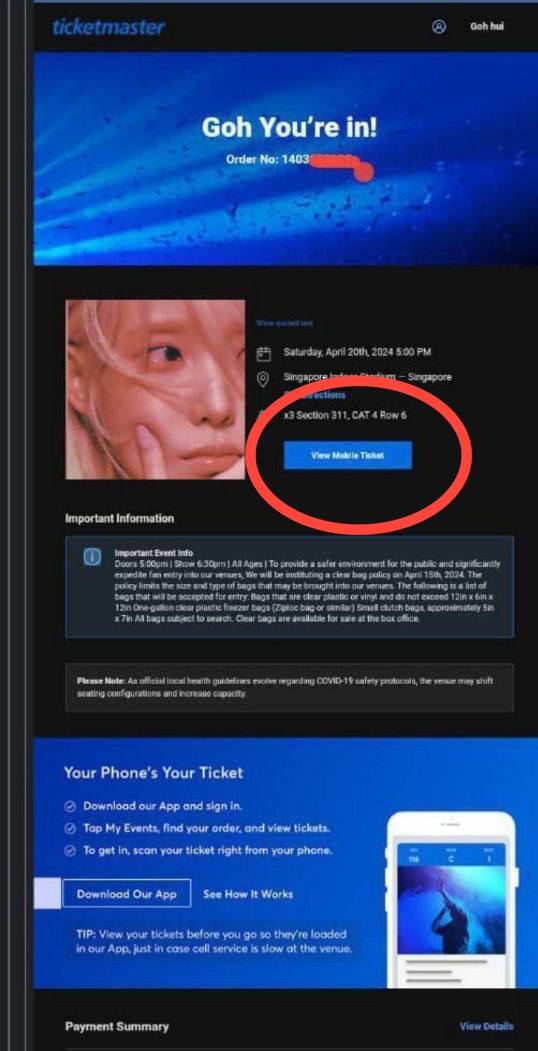
Example of a mobile ticket, which does not exist in Ticketmaster Singapore
If the seller provides a screenshot of a mobile ticket, put your guard up since it is quite rare for Ticketmaster Singapore to issue mobile tickets as compared to other countries. Double check with Ticketmaster if the concert that you are buying tickets for is issuing mobile tickets. As long as it is not a picture of a typical e-ticket or a physical ticket, you are advised to proceed with caution!
That said, an even bigger red flag is when the seller does not provide proof of their ticket at all. I have yet to see this happen on Carousell, but on Telegram some scammers will tell buyers that they can “just check the ticket when we meet up”. To save yourself the emotional rollercoaster, just stop interacting when this red flag comes up.
5. Having access to a seller’s Ticketmaster account does not guarantee that you have not been scammed. It’s not over ‘til it’s over!
Some scammers will allow you to have the login details of their Ticketmaster account as proof that they are selling you authentic tickets. However, the scammer can easily download the PDF file of the e-ticket before handing the reins of their account over to you. This allows them to sell the ticket to multiple buyers even though you have their account. In this case, it would be better to accompany the seller to one of the Ticketmaster box offices to upgrade the e-ticket for a physical ticket. That way, you can verify that the ticket is real while also eliminating the risk of an e-ticket barring your entry to the concert. That can happen if someone else with the e-ticket enters the stadium before you. Stay cautious until you step into the stadium!
6. E-tickets or Print-At-Home tickets have a much higher risk of being forged, as far as possible opt to buy physical tickets. (Plus they are a good keepsake!)
Sometimes, you don’t have to look far to identify modified tickets. It can just be a matter of checking the picture’s resolution. If you zoom in on the picture of the ticket and the text is pixelated (of course, within reason - to some extent any screenshot will be pixelated, especially for fine print.), proceed with caution. It can be a sign that you are dealing with a scammer. Take a look at some of the pictures attached throughout the article, and you will see how the pictures are often pixelated and hard to read. The low quality of the pictures is a sign of them being tampered with, so steer clear of sellers with such pictures. ![]()
Example of a low-resolution pixelated 'ticket' evidence
The above picture has been tampered with, evident from the pixels at the sides of the picture. It is important to be especially careful when dealing with sellers who provide such proof as they may not be truthful about the validity of their tickets.
That said, it doesn’t mean that it is impossible to forge pictures of physical tickets. I have seen modified images of physical tickets that honestly looked legitimate until I had zoomed in. At the end of the day, regardless of what kind of ticket you are sent, check through it thoroughly before making payments (after receiving the ticket, of course).
7. Do not make payments (even in-person) to Shopee Pay QR codes or bank accounts without cross-checking the seller’s identity. (Who even uses Shopee Pay QR codes anyway?)
Scammers might use Shopee Pay QR codes or even bank transfers to receive your money while being based overseas. If your seller asks for payment through these platforms, ask for alternative payment methods. You know the drill, if they refuse or are hesitant to do so, do not interact with them further!
Staying Safe
All in all, this is probably the most important part of the article. For all the scammer tactics out there to trick buyers of their money, there are simple-to-follow steps you can take to counter most of them.
1. Do not make deposits until you have a verified ticket with you.
This was mentioned in the complementary Instagram post that was made with this article, but it is by far the most important measure that any buyer would need to take to better protect themselves against scams. A major concern for sellers is that their buyers will back out of their deals at the eleventh hour, causing them to lose hundreds when they are unable to find a replacement. If you are a real fan of the artist, you will be able to prove how much of a fan you are without a deposit. Each fandom has its inside jokes and if the seller is also a real fan of the artist, they would understand said inside jokes and understand your point of view.
Even if you meet your seller in person, do not provide any payment until you have thoroughly verified the ticket. If it is an e-ticket, ask to meet the seller at the Stadium to accompany them to change it into a physical ticket. Once the e-ticket has been converted into a physical ticket, the e-ticket will become invalid.
It helps if the seller is also going to the same concert. If this is the case, ask to enter the concert venue together and pay for the ticket only after you enter the venue together.
Of course, as purchasing resale tickets is a two-way street, respect your seller as you take steps to ensure your safety. Clearly state your reasoning as to why you are taking such measures and ask for your seller’s understanding.
2. Check if the number you are transferring to is a Singaporean number.
Get the seller to use this Telegram bot to verify that they are based in Singapore. If they are a local seller, even if they scam you they will be subjected to Singapore law. Being scammed by overseas scammers is a dead end, as it is difficult for the Singapore law to reach them.
Do note that as of this writing, the bot is still in its development stages so there may be some glitches. As long as you run the seller’s number through the bot a few times, it should be safe.
To verify that your seller is using a Singaporean number, they can just activate the bot on their side and they can screenshot the verification message from the bot. To use the bot multiple times, just clear the chat and you should be able to use the bot again.
While there is no way to be entirely safe from scams, these tips can protect you against the majority of the concert scams out there. Some of these tips are also applicable to any online transaction, especially on sites that have been flagged as high-risk for scams such as Carousell and Facebook Marketplace. It is important to remain vigilant and take extra measures to minimise the risk of being scammed.
Stay safe and enjoy your concerts!
References
https://www.straitstimes.com/singapore/courts-crime/money-mules-counsellors-worry-as-police-study-shows-almost-half-of-those-recruited-are-under-25 https://www.mha.gov.sg/docs/default-source/media-room-doc/annex-a---e-commerce-scams-by-platforms-2023.pdf?sfvrsn=b5079339_1

